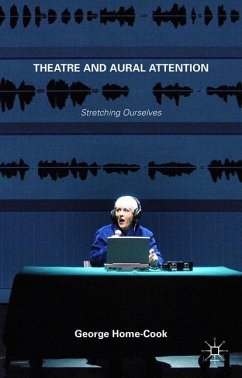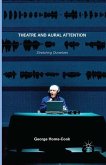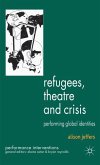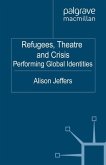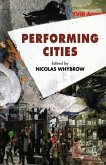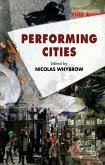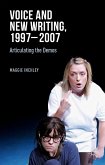Theatre and Aural Attention investigates what it is to attend theatre by means of listening. Focusing on four core aural phenomena in theatre - noise, designed sound, silence, and immersion - George Home-Cook concludes that theatrical listening involves paying attention to atmospheres.
"Without a doubt this book is interesting for practically everyone seriously interested in the relation between theatre and sound. Next to this obvious readership, the re-imagined conceptualization of terms such as atmosphere, scenography, and immersion makes it particularly interesting for theatre and scenography professionals, both scholars and practitioners ... . Home-Cook's study is much more than just a welcome addition; it sparks enormously important discussions and sets a course for future explorations." (Falk Hübner, Journal of Sonic Studies, February, 2017)
"This is a deeply interdisciplinary project, bringing together insights, theories and methodologies from a range of fields, and doing so in a very considerate and meaningful way, weighing terms and arguments and their merit carefully. ... this will be a reference point for the emerging field of study and a rewarding read for scholars, students and practitioners alike." (David Roesner, Theatre Research International, Vol. 41 (2), July, 2016)
"Theatre and Aural Attention: Stretching Ourselves is a welcome contribution to the emerging field of theatre and aurality studies. ... a study not only of listening in the theatre but of the theatricality of listening, it is relevant to theatre and performance studies and also to sound studies, musicology, and anthropology. The detailed investigations of sound techniques via their effect on a listener-spectator will be useful to directors and sound designers wishing to reflect on and develop their practice." (Sarah Barnes, Contemporary Theatre Review, Vol. 26 (3), 2016)
"Theatre and Aural Attention offers a detailed account with a fresh approach to what it means to attend and listen in the theatre. It is significant not only to scholars, designers and practitioners but also to those who simply enjoy going to the theatre." (Yaron Shyldkrot, Theatre and Performance, Vol. 2 (3-4), 2016)
"George Home-Cook's Theatre and Aural Attention: Stretching Ourselves ... is a must-read for students and academics of all things dramaturgical. It calls for an attention to the invisible and offers an earnest contribution to the quest for a listening beyond dialogue in the atmosphere of the performed." (Salomé Voegelin, timeshighereducation.com, December, 2015)
'"George Home-Cook's Theatre and Aural Attention: Stretching Ourselves ... is a must-read for students and academics of all things dramaturgical. It calls for an attention to the invisible and offers an earnest contribution to the quest for a listening beyond dialogue in the atmosphere of the performed." (Salomé Voegelin, timeshighereducation.com, December, 2015)"This is a rigorous, innovative piece of scholarship that forgoes conventional wisdom about sound and hearing in favour of a new paradigm of theatrical attendance that demonstrates the complexity of this act, especially in productions that challenge audiences sonically. George Home-Cook articulates thought processes, bodily experiences, and ways of interpreting acoustic phenomena that often go unnoticed or may only be partially understood. This book demonstrates how much there is to learn about, and from, self-reflexive attention to the act of listening in theatre." - Adrian Curtin, University of Exeter, UK'Theatre and Aural Attention is a landmark study of theatrical listening. It is also a bracing, nuanced account of the spectator's attentional attunements to his or her theatrical environments. Drawing upon the work of contemporary sound designers, the extensive recent scholarship in Sound Studies, and his own phenomenological examination of theatrical listening, George Home-Cook revises deeply-held assumptions about seeing versus hearing, attention versus distraction, theatrical immersion, and the nature of theatrical silence. Its methodology is rigorous and its analysis convincing. As a demonstration of what theatrical phenomenology can accomplish, Theatre and Aural Attention is nothing short of revelatory.' - Stanton B. Garner, Jr., University of Tennessee, USA'But What does it mean to attend theatre? For George Home-Cook it means to be a 'listener-spectator': theatrical attending consists of an encompassing, multi-sensory, participatory experience. Accordingly, this insightful book proposes a new paradigm of theatrical reception-perception from the perspective of attention. By reconsidering listening not as a passive and detached operation, but as an enactive process and as a specialised mode of attention, it proposes that we understand theatrical experience as a dynamic, intersensorial, inter-subjective, bodily engagement with the affordances of the theatrical environment. Home-Cook develops his argument through a vivid engagement with a number of theatrical events and examples and by paying particular attention to (theatre) sound. Theatre and Aural Attention offers a ground-breaking perspective to many fields of research, including the anthropology of sound and the senses, theatre and aurality, spectator studies, and the aesthetics of atmospheres.' - Tonino Griffero, University of Rome Tor Vergata, Italy'Theatre and Aural Attention is an inspiring model for how one might do performance philosophy now: producing new understandings of 'attention' and 'listening' in and through paying attention to theatre and its sounds (as well as to the process of attending itself). That is, Home-Cook does not just describe but performs attention as a dynamic, embodied and creative act and in so doing, he provides a welcome corrective to the idea of attention as 'spotlight,' but also the false opposition of attention and distraction. Clear as a bell, Home-Cook's lucid account leads the reader through the 'messy reality' of theatrical listening with a modest authority, promising to make a real contribution to the kinds of thinking we do about and as theatre audiences.' - Laura Cull, University of Surrey, UK'To listen is to attend; to attend is to stretch from where you are towards an ever-moving target; in the tension of this stretch lies the dynamic of environmental engagement. For Home-Cook, the theatre is not just a place we visit to witness a performance; it is an expe
"This is a deeply interdisciplinary project, bringing together insights, theories and methodologies from a range of fields, and doing so in a very considerate and meaningful way, weighing terms and arguments and their merit carefully. ... this will be a reference point for the emerging field of study and a rewarding read for scholars, students and practitioners alike." (David Roesner, Theatre Research International, Vol. 41 (2), July, 2016)
"Theatre and Aural Attention: Stretching Ourselves is a welcome contribution to the emerging field of theatre and aurality studies. ... a study not only of listening in the theatre but of the theatricality of listening, it is relevant to theatre and performance studies and also to sound studies, musicology, and anthropology. The detailed investigations of sound techniques via their effect on a listener-spectator will be useful to directors and sound designers wishing to reflect on and develop their practice." (Sarah Barnes, Contemporary Theatre Review, Vol. 26 (3), 2016)
"Theatre and Aural Attention offers a detailed account with a fresh approach to what it means to attend and listen in the theatre. It is significant not only to scholars, designers and practitioners but also to those who simply enjoy going to the theatre." (Yaron Shyldkrot, Theatre and Performance, Vol. 2 (3-4), 2016)
"George Home-Cook's Theatre and Aural Attention: Stretching Ourselves ... is a must-read for students and academics of all things dramaturgical. It calls for an attention to the invisible and offers an earnest contribution to the quest for a listening beyond dialogue in the atmosphere of the performed." (Salomé Voegelin, timeshighereducation.com, December, 2015)
'"George Home-Cook's Theatre and Aural Attention: Stretching Ourselves ... is a must-read for students and academics of all things dramaturgical. It calls for an attention to the invisible and offers an earnest contribution to the quest for a listening beyond dialogue in the atmosphere of the performed." (Salomé Voegelin, timeshighereducation.com, December, 2015)"This is a rigorous, innovative piece of scholarship that forgoes conventional wisdom about sound and hearing in favour of a new paradigm of theatrical attendance that demonstrates the complexity of this act, especially in productions that challenge audiences sonically. George Home-Cook articulates thought processes, bodily experiences, and ways of interpreting acoustic phenomena that often go unnoticed or may only be partially understood. This book demonstrates how much there is to learn about, and from, self-reflexive attention to the act of listening in theatre." - Adrian Curtin, University of Exeter, UK'Theatre and Aural Attention is a landmark study of theatrical listening. It is also a bracing, nuanced account of the spectator's attentional attunements to his or her theatrical environments. Drawing upon the work of contemporary sound designers, the extensive recent scholarship in Sound Studies, and his own phenomenological examination of theatrical listening, George Home-Cook revises deeply-held assumptions about seeing versus hearing, attention versus distraction, theatrical immersion, and the nature of theatrical silence. Its methodology is rigorous and its analysis convincing. As a demonstration of what theatrical phenomenology can accomplish, Theatre and Aural Attention is nothing short of revelatory.' - Stanton B. Garner, Jr., University of Tennessee, USA'But What does it mean to attend theatre? For George Home-Cook it means to be a 'listener-spectator': theatrical attending consists of an encompassing, multi-sensory, participatory experience. Accordingly, this insightful book proposes a new paradigm of theatrical reception-perception from the perspective of attention. By reconsidering listening not as a passive and detached operation, but as an enactive process and as a specialised mode of attention, it proposes that we understand theatrical experience as a dynamic, intersensorial, inter-subjective, bodily engagement with the affordances of the theatrical environment. Home-Cook develops his argument through a vivid engagement with a number of theatrical events and examples and by paying particular attention to (theatre) sound. Theatre and Aural Attention offers a ground-breaking perspective to many fields of research, including the anthropology of sound and the senses, theatre and aurality, spectator studies, and the aesthetics of atmospheres.' - Tonino Griffero, University of Rome Tor Vergata, Italy'Theatre and Aural Attention is an inspiring model for how one might do performance philosophy now: producing new understandings of 'attention' and 'listening' in and through paying attention to theatre and its sounds (as well as to the process of attending itself). That is, Home-Cook does not just describe but performs attention as a dynamic, embodied and creative act and in so doing, he provides a welcome corrective to the idea of attention as 'spotlight,' but also the false opposition of attention and distraction. Clear as a bell, Home-Cook's lucid account leads the reader through the 'messy reality' of theatrical listening with a modest authority, promising to make a real contribution to the kinds of thinking we do about and as theatre audiences.' - Laura Cull, University of Surrey, UK'To listen is to attend; to attend is to stretch from where you are towards an ever-moving target; in the tension of this stretch lies the dynamic of environmental engagement. For Home-Cook, the theatre is not just a place we visit to witness a performance; it is an expe
'"George Home-Cook's Theatre and Aural Attention: Stretching Ourselves ... is a must-read for students and academics of all things dramaturgical. It calls for an attention to the invisible and offers an earnest contribution to the quest for a listening beyond dialogue in the atmosphere of the performed." (Salomé Voegelin, timeshighereducation.com, December, 2015)"This is a rigorous, innovative piece of scholarship that forgoes conventional wisdom about sound and hearing in favour of a new paradigm of theatrical attendance that demonstrates the complexity of this act, especially in productions that challenge audiences sonically. George Home-Cook articulates thought processes, bodily experiences, and ways of interpreting acoustic phenomena that often go unnoticed or may only be partially understood. This book demonstrates how much there is to learn about, and from, self-reflexive attention to the act of listening in theatre." - Adrian Curtin, University of Exeter, UK'Theatre and Aural Attention is a landmark study of theatrical listening. It is also a bracing, nuanced account of the spectator's attentional attunements to his or her theatrical environments. Drawing upon the work of contemporary sound designers, the extensive recent scholarship in Sound Studies, and his own phenomenological examination of theatrical listening, George Home-Cook revises deeply-held assumptions about seeing versus hearing, attention versus distraction, theatrical immersion, and the nature of theatrical silence. Its methodology is rigorous and its analysis convincing. As a demonstration of what theatrical phenomenology can accomplish, Theatre and Aural Attention is nothing short of revelatory.' - Stanton B. Garner, Jr., University of Tennessee, USA'But What does it mean to attend theatre? For George Home-Cook it means to be a 'listener-spectator': theatrical attending consists of an encompassing, multi-sensory, participatory experience. Accordingly, this insightful book proposes a new paradigm of theatrical reception-perception from the perspective of attention. By reconsidering listening not as a passive and detached operation, but as an enactive process and as a specialised mode of attention, it proposes that we understand theatrical experience as a dynamic, intersensorial, inter-subjective, bodily engagement with the affordances of the theatrical environment. Home-Cook develops his argument through a vivid engagement with a number of theatrical events and examples and by paying particular attention to (theatre) sound. Theatre and Aural Attention offers a ground-breaking perspective to many fields of research, including the anthropology of sound and the senses, theatre and aurality, spectator studies, and the aesthetics of atmospheres.' - Tonino Griffero, University of Rome Tor Vergata, Italy'Theatre and Aural Attention is an inspiring model for how one might do performance philosophy now: producing new understandings of 'attention' and 'listening' in and through paying attention to theatre and its sounds (as well as to the process of attending itself). That is, Home-Cook does not just describe but performs attention as a dynamic, embodied and creative act and in so doing, he provides a welcome corrective to the idea of attention as 'spotlight,' but also the false opposition of attention and distraction. Clear as a bell, Home-Cook's lucid account leads the reader through the 'messy reality' of theatrical listening with a modest authority, promising to make a real contribution to the kinds of thinking we do about and as theatre audiences.' - Laura Cull, University of Surrey, UK'To listen is to attend; to attend is to stretch from where you are towards an ever-moving target; in the tension of this stretch lies the dynamic of environmental engagement. For Home-Cook, the theatre is not just a place we visit to witness a performance; it is an expe

